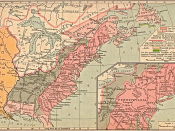Britain's policy of salutary neglect created an atmosphere of negligence that molded and ultimately determined the manner in which the colonies developed. Even though the policy was in Britain's best interests at the time, it had disastrous repercussions for the empire. By allowing the colonies to mature unguided, the tide turned against Britain and ultimately the colonies developed legislative assemblies, encouraged commerce, and permitted unconventional religions, all of which were in direct conflict with common English practices.
Britain's implementation of salutary neglect inadvertently caused the colonial legislative body to pass laws that were desirable for the population; these laws often went against British policy. Certain states, including Virginia, had a legislative body that "reflected the authority of England"ÃÂ1 and the State. English common laws were modified for local purposes but for the most part remained unchanged. However, the local populous were naturally inclined to seek legal action from their local courts rather than the higher, English dominated, courts.
Inadvertent repercussions including being biased about court selection paved the path for a more defiant local legal systems. For instance, the state of Massachusetts, which at the time was comprised mainly of Puritans, passed numerous legislative laws that directly coincided with the Puritan faith. Massachusetts's law mandated that children be educated in order to read and understand the bible. The "Old Deluder Satan Act"ÃÂ2 was passed to prevent "Satan"ÃÂ from depriving men from understanding the bible. Of course this act was the result of Puritan influence. Unlike colonial America, Britain was strongly opposed to any such belief. Other states such as Maryland and Pennsylvania were mainly settled by Catholics and Quakers, thus their legal systems agreed with their values. Unfortunately, these trifle matters often caused political controversy.
Equally important and just as divisive was the relative religious freedom offered in colonial America.


